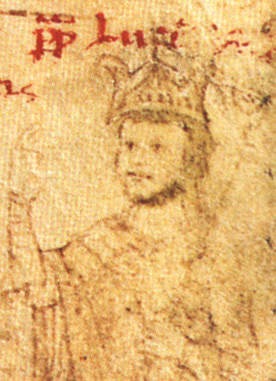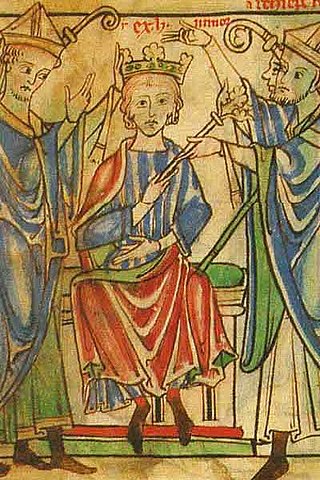Related Research Articles

Alexios II Komnenos, Latinized Alexius II Comnenus, was Byzantine emperor from 1180 to 1183. He ascended to the throne as a minor. For the duration of his short reign, the imperial power was de facto held by regents.

Pope Lucius III, born Ubaldo Allucingoli, reigned from 1 September 1181 to his death in 1185. Born of an aristocratic family of Lucca, prior to being elected pope, he had a long career as a papal diplomat. His papacy was marked by conflicts with Holy Roman Emperor Frederick I, his exile from Rome and the initial preparations for the Third Crusade.

William Marshal, 1st Earl of Pembroke, also called William the Marshal, was an Anglo-Norman soldier and statesman. He served five English kings—Henry II, his sons the "Young King" Henry, Richard I, and John, and finally John's son Henry III.

Henry the Young King was the eldest son of Henry II of England and Eleanor of Aquitaine to survive childhood. Beginning in 1170, he was titular King of England, Duke of Normandy, Count of Anjou and Maine. Henry the Young King was the only English king since the Norman Conquest to be crowned during his father's reign, but was frustrated by his father's refusal to grant him meaningful autonomous power. He died, aged 28, six years before his father, leaving his brother Richard to become the next king.
Constance was Duchess of Brittany from 1166 to her death in 1201 and Countess of Richmond from 1171 to 1201. Constance was the daughter of Duke Conan IV by his wife, Margaret of Huntingdon, a sister of the Scottish kings Malcolm IV and William I.
Ruben III, also Roupen III, Rupen III, or Reuben III, was the ninth lord of Armenian Cilicia (1175–1187).
Geoffrey was an illegitimate son of King Henry II of England who became bishop-elect of Lincoln and archbishop of York. The identity of his mother is uncertain, but she may have been named Ykenai. Geoffrey held several minor clerical offices before becoming Bishop of Lincoln in 1173, though he was not ordained as a priest until 1189. In 1173–1174, he led a campaign in northern England to help put down a rebellion by his legitimate half-brothers; this campaign led to the capture of William, King of Scots. By 1182, Pope Lucius III had ordered that Geoffrey either resign Lincoln or be consecrated as bishop; he chose to resign and became chancellor instead. He was the only one of Henry II's sons present at the king's death.
Sir John Lexington was a baron and royal official in 13th century England. He has been described as having been Lord Chancellor, but other scholars believe he merely held the royal seals while the office was vacant or the chancellor was abroad. He served two terms, once from 1247 to 1248, and again from 1249 to 1250.

Walter de Coutances was a medieval Anglo-Norman bishop of Lincoln and archbishop of Rouen. He began his royal service in the government of Henry II, serving as a vice-chancellor. He also accumulated a number of ecclesiastical offices, becoming successively canon of Rouen Cathedral, treasurer of Rouen, and archdeacon of Oxford. King Henry sent him on a number of diplomatic missions and finally rewarded him with the bishopric of Lincoln in 1183. He did not remain there long, for he was translated to Rouen in late 1184.

William FitzRobert, 2nd Earl of Gloucester was the son and heir of Sir Robert de Caen, 1st Earl of Gloucester, and Mabel FitzRobert of Gloucester, daughter of Robert Fitzhamon, and nephew of Empress Matilda.

The Dean of St Patrick's Cathedral is the senior cleric of the Protestant St Patrick's Cathedral, Dublin, elected by the chapter of the cathedral. The office was created in 1219 or 1220, by one of several charters granted to the cathedral by Archbishop Henry de Loundres between 1218 and 1220.
Herbert Poore or Poor (died 1217) was a medieval English clergyman who held the post of Bishop of Salisbury during the reigns of Richard I and John.

The Lion in Winter is a 1968 historical drama film set at Christmas 1183; it centres on political and personal turmoil among the royal family of Henry II of England, his wife Eleanor of Aquitaine, their three surviving sons, and the French king. The film was directed by Anthony Harvey; written by James Goldman ; produced by Joseph E. Levine, Jane C. Nusbaum, and Martin Poll; and starred Peter O'Toole, Katharine Hepburn, John Castle, Anthony Hopkins, Jane Merrow, Timothy Dalton and Nigel Terry.
Gerardo Allucingoli was an Italian cardinal and cardinal-nephew of Pope Lucius III, who elevated him in 1182.
James Amiraux Jérémie was Professor of Classical Literature at The East India Company College 1830–50, Regius Professor of Divinity at the University of Cambridge from 1850, and Dean of Lincoln.

Geoffrey is an English and French masculine given name. It is generally considered the Anglo-Norman form of the Germanic compound *gudą 'god' and *friþuz 'peace'. It is a derivative of Dutch Godfried, German Gottfried and Old English Gotfrith and Godfrith.
Events from the 1180s in England.

Edward North, 1st Baron North was an English peer and politician. He was the Clerk of the Parliaments 1531–1540 and Lord Lieutenant of Cambridgeshire 1557–1564. A successful lawyer, he was created the first Baron North, giving him a seat in the House of Lords.
Michael Belet was an English judge, sheriff of Worcestershire 1176-81 and again in 1184, of Wiltshire 1180-82, of Leicestershire and Warwickshire in conjunction with Ralph Glanvill 1185-87, and alone 1189-00. He appears as a justice itinerant for Warwickshire and Leicestershire in 1177, in the following year for Lincolnshire, and in 1179, on the redistribution of circuits which then took place, he was assigned for the eastern circuit.
John Komnenos was the second son of the Byzantine aristocrat, and emperor in 1183–1185, Andronikos I Komnenos. His father appointed him co-emperor over his older brother Manuel, but when Andronikos was deposed on 12 September 1185, John was also seized and probably killed.